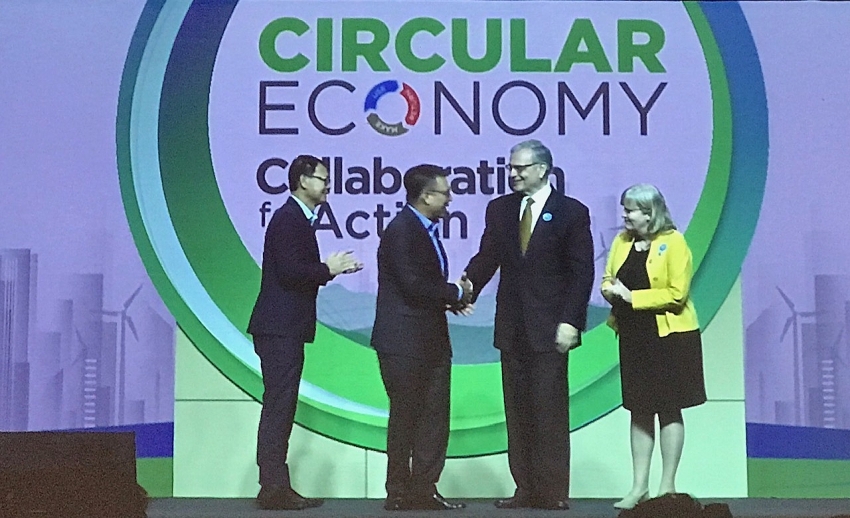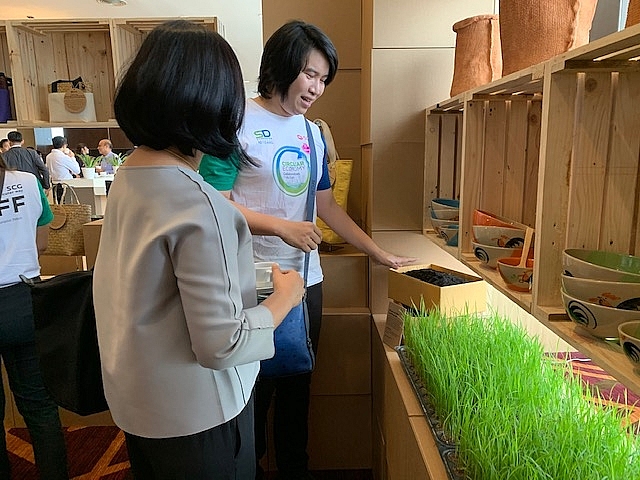Long Son Petrochemical Complex to be SCG's model for circular economy
Taking with VIR at the sidelines of the Sustainable Development Symposium on August 26 in Bangkok, Roongrote Rangsiyopash, president and CEO of SCG, confirmed that Long Son Petrochemical Complex will be developed under the concept of the circular economy and it will become one of the model projects for others to follow.
 |
| The Sustainable Development Symposium – 10 years of SCG held in August at Bangkok |
“The concept of the circular economy will start from oursevles and ecompass all steps of the construction of this project. We have to make sure that this will be a good example and that all contractors and people who are engaged in the construction are compliant with the cirlcular economy,” Rangsiyopash said.
From this project, local authorities can start to engage with the local schools and vocational colleges to educate and elicit the participation of all of the students. “We see that the students of local colleges are very active. They are actually very good in adopting and understanding the concept of the circular economy so I look forward to promoting it to other countries as well, and this can be a good example for every one,” Rangsiyopash said.
Long Son Chemical Complex is located in Long Son commune of Ba Ria-Vung Tau, just 100 kilometres from Ho Chi Minh City. The complex is positioned as Vietnam’s first integrated petrochemical complex to produce a total capacity of up to 1.6 million tonnes of olefins per year. The complex is designed to produce various petrochemical products, including essential plastic materials such as polyethylene, polypropylene, and other products in excess of 2 million tonnes per year, enabling it to substitute the import of polyolefin products.
 |
| SCG is one of the leading conglomerates in the ASEAN, comprising of three core businesses: SCG Cement-Building Materials, SCG Chemicals, and SCG Packaging |
Non-petrochemical supporting infrastructure, such as a deepsea ports and other facilities, are also included. Operations will strictly follow safety standards, they will be environmentally friendly where possible, and will care for neighbouring communities and the general environment under SCG’s vision of becoming the region’s sustainable business leader, enhancing the quality of life for all.
SCG began expanding its business to Vietnam in 1992, and now targets doing most of their business here. So far, there are 23 subsidiaries and affiliates with over 8,300 labourers working in Vietnam.
The 10th Susatainable Development symposium held by SCG was participated in by 44 partners and more than 1,500 participants from the government, academia, NGOs, as well as the private and public sectors both from Thailand and abroad.
The goal is to brainstorm for solutions to the crisis of resource constraints by using the circular economy as a major component with the approach of “Resource maximisation, waste separation, and proper disposal” to ensure resource efficiency throughout the manufacturing and consumption cycle.
The collaboration aims at creating a sustainable industry, combating plastic pollution in the oceans, improving the lives of the surrounding communities, and managing industrial waste.
The event has highlighted solutions encompassing the infrastructure system, knowledge sharing, innovation, and technology development, as well as waste treatment. The alliance also sets to put forward a proposal on waste management as a national agenda.
According to Rangsiyopash, with the world population expected to reach an estimated 9.7 billion in 2050, consumption demand keeps rising while resources are finite.
“Data shows that Thai people produce an average of 1.15 kilogrammes of rubbish per person, and the waste generation rate is on the surge. In 2018 alone, Thailand put out 28 million tonnes of waste. Without proper waste management and disposal practices, waste will leak into the oceans, triggering the loss of marine biodiversity, which was recently evidenced by the death of young dugong Mariam,” he said.
The Circular Economy is a solution to help alleviate these problems as it promotes the regenerative model of make-use-return. This concept also includes the approaches of resource maximisation, waste separation, and proper disposal to preserve natural resources for the next generations.
Throughout the years, SCG has incorporated circular economy principles into its business activities with three strategies: reduced material use and durability by reducing resource use in the manufacturing and development of products with extended usage duration, upgrading and replacing products and raw materials with new ones that offer higher efficiency while minimising resource usage or making them recycle-friendly and reuseable and recycleable.
In 2018, SCG had converted about 313,000 tonnes of industrial waste into renewable raw materials and turned 131,000 tonnes of industrial waste into fuel substitutes.
In 2019, SCG has continued to integrate circular economy principles into product manufacturing and has set the target of reducing the production of single-use plastic from 46 to 20 per cent by 2025 and increasing the proportion of recyclable, reusable, and biodegradable plastics to 100 per cent by 2025.
What the stars mean:
★ Poor ★ ★ Promising ★★★ Good ★★★★ Very good ★★★★★ Exceptional
Related Contents
Latest News
More News
- VinaCapital launches Vietnam's first two strategic-beta ETFs (February 26, 2026 | 09:00)
- PM sets five key tasks to accelerate sci-tech development (February 26, 2026 | 08:00)
- PM outlines new tasks for healthcare sector (February 25, 2026 | 16:00)
- Citi report finds global trade transformed by tariffs and AI (February 25, 2026 | 10:49)
- Vietnam sets ambitious dairy growth targets (February 24, 2026 | 18:00)
- Vietnam, New Zealand seek level-up in ties (February 19, 2026 | 18:06)
- Untapped potential in relations with Indonesia (February 19, 2026 | 17:56)
- German strengths match Vietnamese aspirations (February 19, 2026 | 17:40)
- Vietnam’s pivotal year for advancing sustainability (February 19, 2026 | 08:44)
- Strengthening the core role of industry and trade (February 19, 2026 | 08:35)

 Tag:
Tag:


















 Mobile Version
Mobile Version